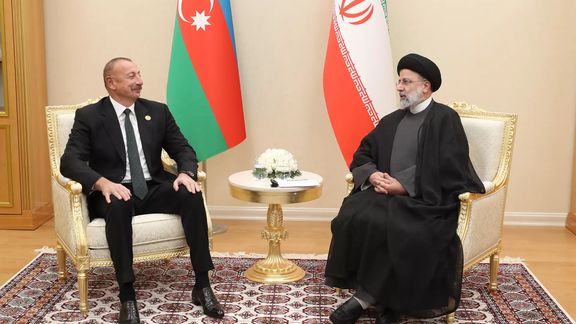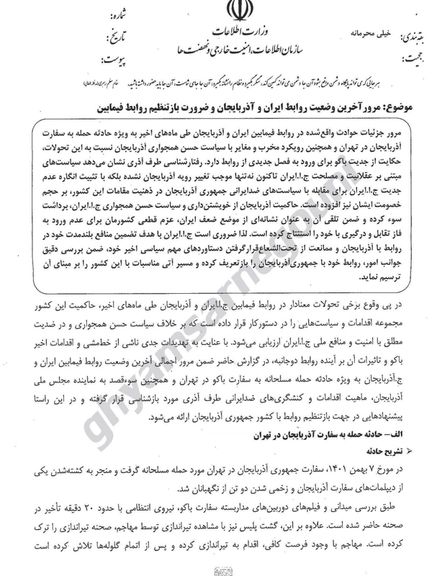Hacked Document Shows Tehran Debating To ‘Redefine’ Ties With Baku

A report, claimed by an opposition group to have been hacked from the Iranian presidency servers, advises the government to redefine its relations with Azerbaijan.

A report, claimed by an opposition group to have been hacked from the Iranian presidency servers, advises the government to redefine its relations with Azerbaijan.
“The government of Azerbaijan has misunderstood the self-restraint and good-neighborliness policies of the Islamic Republic of Iran as its weakness and inferred out country’s determination to avoid conflict with itself,” the report released by MEK-affiliated Telegram account GhyamSarnegouni (Uprising till Overthrow) Monday says.
The group released a trove of secret and top-secret document on Monday that it said were obtained by hacking the government’s servers.
Describing Baku’s actions as “serious threats,” the report provides a summary of recent developments in bilateral relations and a summary of Azerbaijan’s relations with other regional players, Turkey and Israel, in the context of its relations with the Islamic Republic of Iran and says failing to redefine relations will lead to “increased hostility” from Azerbaijan.
“Undoubtedly, the Zionist regime will be the principal beneficiary of heightened tensions between the two sides,” the report says.
The report, which MEK claims was among thousands of other documents it acquired, was apparently made by the foreign intelligence and security department of the ministry. The undated report, possibly a draft, is marked as “very confidential” but does not bear a reference number or signature.

An official of the presidential office, Mohammad-Mehdi Rahimi, claimed Monday afternoon that the presidency website had only temporarily been deactivated to carry out site security maintenance for a new version launched last week.
Tensions have been high between Iran and Azerbaijan since November 2022 when both sides accused each other of engaging in terrorism and espionage in the other’s territory.
Iran has suggested Azerbaijani involvement in the October 26 attack in Shiraz claimed by the Islamic State group (Isis-Daesh) and, also in the report accuses Baku of harboring Israeli intelligence and military elements that plan to use its territory in a possible attack against Iran’s nuclear facilities.
The two countries in early May expelled each other’s diplomats after incidents that Baku also dubbed as "terrorist attacks". These included a gunman’s attack on Azerbaijani diplomatic mission in Tehran in January after which Baku shut down the embassy and an attack on Azerbaijani lawmaker Fazil Mustafa in March, who is an outspoken critic of the Islamic Republic.
Ethnic and religious issues complicate relations between Tehran and Baku and both parties have been using these factors against each other.
Around a quarter of Iran’s population is Turki-speaking Azari, with analysts and activists disagreeing over the closeness of their cultural-linguistic links to their neighbors to the north. Iran fears separatism in its northwestern regions encouraged by Azerbaijan.
On the other hand, Azerbaijan has a large Shiite population that is susceptible to agitation by the Islamic Republic, which considers itself the leader of the Shiite world. Supreme Leader Ali Khamenei is often referred to as the "leader of world Muslims".
The Albania-based opposition group claimed it had breached 120 servers of the presidential office and accessed internal communications and minutes of meetings as well as President Ebrahim Raisi’s online conference platforms and about 1,300 computers inside the office.
Hackers posted images of MEK leaders, Maryam Rajavi and her husband Masoud who has not been seen in public since 2003, and defaced pictures of Supreme Leader Ali Khamenei and President Ebrahim Raisi on the compromised websites.
Without any details, some Iranian news websites reported -- a few hours after the MEK’s announcement Monday that they had hacked the website of the presidency – that the website could not be reached.
In early May the group released hundreds of identification documents, minutes of meetings, copies of correspondence, phone numbers of foreign ministry officials, and the names of 11,000 employees.